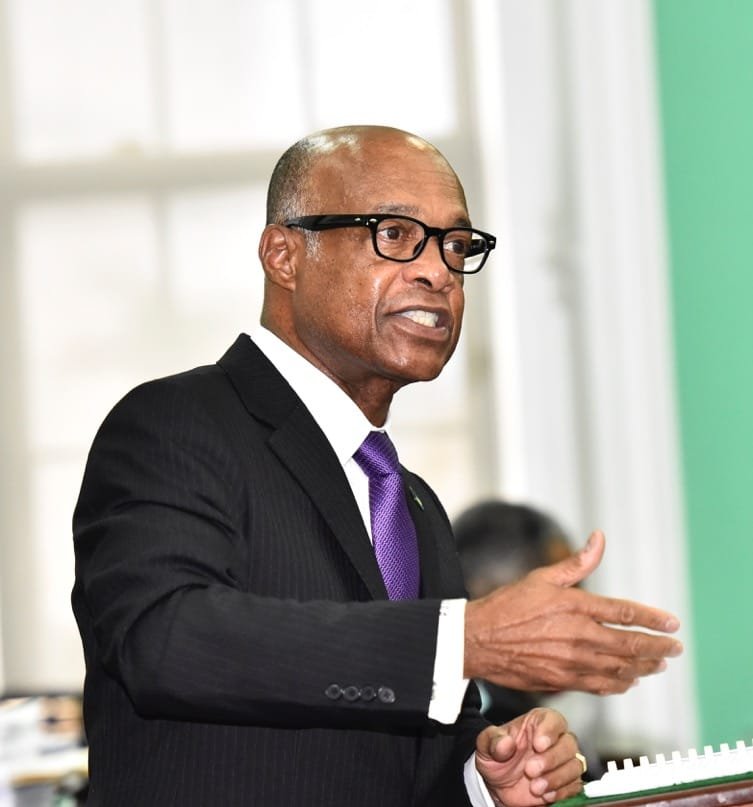NASSAU, BAHAMAS — The Ministry of Education (MOE) has seen an $11 million decrease in capital expenditure at the mid-point of the fiscal year due in large part to the discontinuation of on-campus/face-to-face instruction due to the COVID-19 pandemic, according to Education Minister Jeffrey Lloyd.
Lloyd, who was making his contribution in Parliament to the mid-year debate yesterday, noted that capital expenditure for the Ministry of Education at mid-year 2020/2021 decreased by $11,363,178 from $35,257,215 in 2019/2020 to $23,894,037 in 2020/2021.
“It should be noted that the decrease in expenditure is due mainly to the COVID-19 pandemic and the subsequent relative reduction in goods and services required as a consequence of shuttering of our brick-and-mortar campuses to face-to-face instruction,” said Lloyd.
“Additionally, the use of the virtual school and reduced hours of work have significantly reduced payments for expenditures such as coaching allowances, post of responsibility, after-school programmes and supply teachers [which] were reduced in the personal emoluments and allowances blocks…
“There were reduced purchases in supplies items, with the exception of an increase in personal protective equipment (PPE), cleaning and disinfecting products.”
He added: “Companies have been contracted to deep-clean schools and offices, including our headquarters on University Boulevard. Plexiglass sneeze barriers, along with additional signage, had to be installed throughout our schools and satellite offices.
“These improvements, coupled with our annual school repairs, had to be carried out in the midst of emergency orders, lockdowns and the observation of safety protocols, as stipulated by the Ministry of Health.”
The minister also noted: “Due to COVID-19, the annual inspection of schools by the Ministry of Works for the development of scopes of works was delayed, which resulted in a domino effect in terms of scopes being prepared, contractors being selected and contractors being mobilized.
“The lockdowns were especially restrictive as contractors were only able to work a limited number of hours during the week. A shortage of funds for mobilizations further delayed projects, some of which are only now being started.
“The majority of Family Island school repair projects were carried out as usual, with the exception of those islands which may have seen a spike in their COVID-19 numbers, which resulted in some restrictive measures being implemented and subsequent delays occurring.”
According to Lloyd, post-Dorian repairs at all schools on Grand Bahama are now complete.
“In Abaco, most post-Dorian school repairs are either complete or are nearing completion,” said Lloyd.
He further noted: “With the global slowdown resulting in tourism, our main economic driver, virtually coming to a trickle, this, too, has resulted in a trickle-down effect on the disbursement of funds from the Ministry of Finance.
“In order to offset this, repair projects were prioritized so that schools would be able to open and function as much as possible this school year, 2020-2021. This included projects essential to campus operations.
“Our 2020 capital projects budget totaled $25,371,942.64, and I am pleased to report that despite awaiting second payments totaling $9,704,863.42 from the Ministry of Finance, school repairs and works progressed to the point where schools are once again able to safely open and welcome the majority of our students throughout the country.
“Regarding the sanitization of the physical plant at the Ministry of Education headquarters, schools and satellite offices, $76,476.02 was paid out to companies to deep-clean these spaces.
“The Ministry of Education is satisfied that the monies were well-spent to make our schools and workplaces safe while following the Ministry of Health protocols for our staff and students.”






